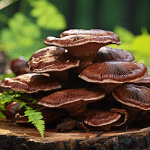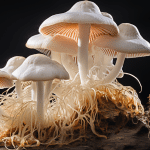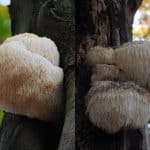Cancer survivors praised medicinal mushrooms for their ability to help with cancer treatments and reduce symptoms from chemotherapy. We were curious about using medicinal mushrooms for bladder cancer, so we took a closer look at available studies. We were impressed, and you will be, too.
What is Bladder Cancer?
Bladder cancer is a malignant form of cancer caused when the bladder cells grow out of control. It is a common cancer type in adults, and far less likely to occur as a form of childhood cancer. According to the American Cancer Society, White, older, male patients are most likely to receive a diagnosis of bladder cancer, and men have about a 1-in-27 chance of developing the type in their lifetime.
Common Bladder Cancer Symptoms
There are several types of bladder cancer, each of which has slightly different symptoms, which can include:
- blood in urine
- burning sensation or pain while urinating
- frequent urination, especially at night
- feeling the need to urinate without being able to do so
- extreme lower back pain without an apparent cause
Learn more: What are functional mushrooms?
What Are Standard Bladder Cancer Treatment Options?
People who are suffering from cancer typically have four conventional treatments, regardless of their type: surgery, chemotherapy, radiation, and immunotherapy.
Even after your bladder cancer goes into remission, it is important to make regular visits to your health center to get checked for cancer and prevent it, because it is very possible that your bladder cancer will return or migrate to another organ, particularly if it is malignant.
What Are the Best Functional Mushrooms for Bladder Cancer?
Using alternative medicine, and especially medicinal mushrooms, to cure illness is not a new thing. Eastern medicine has been using mushrooms for centuries to cure illnesses.
Western medicine has recently begun looking at the potential anti-tumor effects that many mushrooms may offer. The studies of medicinal mushrooms and bladder cancer are stronger on some mushrooms than others. Several mushrooms (such as cordyceps, Maitake, and Reishi) have shown potential in treating bladder cancer, and they merit further investigation.
Cordyceps Mushroom
One of the many benefits of cordyceps is the potential it has for assisting with the treatment of cancer. Both Cordyceps sinensis and Cordyceps militaris appear quite useful for treating different forms of cancer, including bladder cancer.
For example, one Chinese study investigated the effects of cordycepin, a compound that is usually found in Cordyceps militaris and Cordyceps sinensis, on human bladder cancer cells. The results showed that a cordyceps mushroom compound induced the apoptosis of tumor cells through activation of the adenosine A3 receptor.
A Korean study on humans investigated the effects of different adaptogenic mushrooms for metastatic bladder cancer to the lungs.
A 74-year-old man diagnosed with bladder cancer which had metastasized to his lung refused conventional treatment options. Instead, he was given nutritional supplements containing adaptogenic mushrooms, including cordyceps. After 4 months, the mans lung cancer was not as prominent, and symptoms had decreased considerably.
Although further studies are needed, this clinical, anecdotal study shows a lot of promise in terms of using cordyceps to treat bladder cancer.
Learn more: Mushroom tea benefits
Maitake Mushroom
Maitake extract seems quite useful in treating bladder cancer, at least according to the bladder cancer study published in 2009 in The International Journal of General Medicine. This research investigated the effects of maitake mushrooms (Grifola frondosa) in a 87-year-old man suffering from bladder cancer. After two years, when the study was published, the man appeared in good health. His once-advanced cancer was in remission, even though his sole therapy was a oral-based extract of Maitake mushrooms.
Let us avoid drawing any broad conclusions from one persons trial. However, considering there are no downsides to eating Maitake, you may want to consider including it in your diet. While, of course, seeking advice about cancer management and treatments from health professionals.
Reishi Mushroom
Next to cordyceps mushrooms, reishi mushrooms (Ganoderma lucidum) are the mushrooms that have been studied most extensively for their effects on bladder cancer. According to a study published in the journal Cancer Letters, reishi suppresses the growth of bladder cancer cells.
A study of the effects of immune-modulating substances found in reishi mushrooms concluded that the mushroom has the capacity to modulate cytokine production through enhancing the number of bone marrow macrophages. Cytokines are a type of protein that influence the body’s immune response. By increasing cytokine production and marrow compounds (including the production of white blood cells), the reishi mushroom may boost your body’s cancer-fighting abilities.
Lion’s Mane Mushroom
Although no studies are available specifically examining Hericium erinaceus effects on bladder cancer, mane has shown promise as an anticancer agent in several studies in both tumor cells and animals. A study from 2020 investigated the effects of Hericium erinaceus on colorectal cancer. Compounds found within the lions mane fruit bodies were shown to induce colon cancer cell apoptosis.
Anecdotal evidence also suggests that this hirsute-looking mushroom may help people to combat cancer, and reduce the side effects of chemotherapy, like nausea and fatigue. Given its anti-cancer properties, it is not unreasonable to suspect that Lion’s Mane may have some benefit for treating bladder cancer. However, further laboratory studies are needed to understand the basic mechanisms underlying Hericium erinaceus and its potential for treating bladder cancer.
Turkey Tail Mushroom
Turkey Tail (Trametes versicolor) is an adaptogenic mushroom known for anti-cancer properties. While no studies have been conducted regarding this mushrooms effects specifically on bladder cancer, it is likely that you may benefit from Turkey Tail mushrooms in the course of treatment for bladder cancer. Turkey tail may even be fairly useful for taking while undergoing chemotherapy in order to help with your overall immune system.
Immunomodulators, which are often used in treatment for cancer, have many side effects, including stomachaches, weakness, diarrhea, and aches. According to a 2019 study published in the Journal of Integrative Medicine and Complementary Therapies, using turkey tail as a complement to immunomodulators may reduce the drugs side effects, particularly nausea, neuropathy, and organ damage.
What is the Best Mushroom to Fight Bladder Cancer?
There is not enough research into medicinal mushrooms and bladder cancer to definitively decide what types of mushrooms are best for patients suffering from the disease. The most studies and clinical practices that support its use is the cordyceps mushroom. If you are looking for a single dietary substance that can fight bladder cancer, the extract from the cordyceps mushroom is the top candidate.
You don’t have to restrict yourself to just one mushroom, however. When it comes to medicinal mushrooms, the whole is greater than the sum of the parts. The medicinal mushrooms listed in this post all demonstrate synergistic potency, meaning that they are likely to work better if taken together, rather than if you choose to only use one type of mushroom. I personally take Reishi, Chaga, Turkey Tail, Lion’s Mane, and Cordyceps every single day, in hopes of preventing myself from having to experience any form of cancer in the future.















